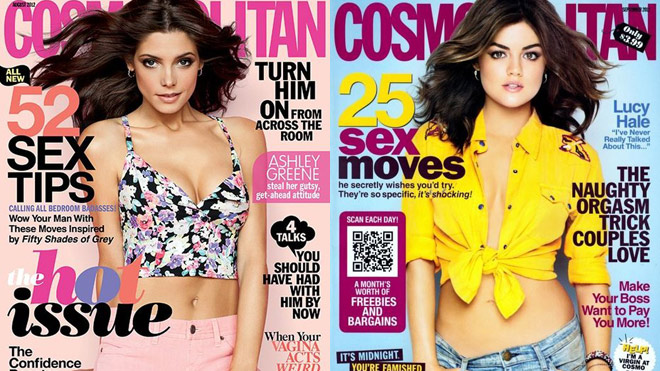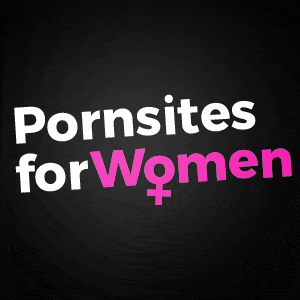By Calico Rudasill, Sssh.com Porn For Women
As you’ve probably heard, RiteAid and Delhaize America, owner of the Hannaford Stores and Food Lion chains, has announced it is going to start putting ‘blinders’ over copies of Cosmopolitan magazine for sale in its stores, giving Cosmo the same treatment as pornographic magazines.

Read on…
The decision is the result of lobbying by Victoria Hearst (granddaughter of William Randolph Hearst, who founded Hearst Corp, which publishes Cosmo) and the National Center on Sexual Exploitation – a group which recently changed its name from Morality In Media when it finally realized the ‘majority’ didn’t actually agree with the organization’s Puritanical views about what should and shouldn’t be available to Americans as reading and viewing material.
One Hell of a Hollow Victory
Following the decision, the NCSE declared victory, claiming RiteAid’s decision represented a “major blow” to Hearst’s profits and taking the opportunity to again list its grievances against the Cosmo as a publication.
“Cosmopolitan magazine regularly features articles, and occasionally explicit pictures, encouraging girls to participate in group, anal, and violent torture sex, and it blatantly targets young girls by displaying teen idols on their covers,” the NCSE said in its statement. “Recently, Cosmo even posted an article encouraging readers to visit hardcore porn sites, including one site that is particularly focused on the extremely violent torture of women.”
While some of what NCSE says about Cosmo may be true (under their definition of “explicit” anyway), the open question here in the year 2015 is whether putting blinders on physical copies of Cosmo will have any impact whatsoever on the group of people with whom NCSE and Patricia Hearst claim to be concerned.
Various studies around the world in recent years have concluded young people are more likely to read off screens than from printed pages, meaning computers and mobile devices are their primary mediums of choice for reading.
In the UK, a 2013 survey of 35,000 readers ages 8-16 found 39% read every day on their computers as opposed to 28% who read paper-based materials. The same survey found 97% of these readers had access to a computer and 77% had a computer or mobile device of their own.
When 97% of young people have access to computers and the vast, vast majority of those computers are online, does anybody really think putting blinders on Cosmo is going to have an ounce of impact on kids accessing the kind of materials on which NCSE and Patricia Hearst are so damn hung up?
NCSE: Time to Join the 21st Century
While part of me hesitates to encourage someone like NCSE President Pat Truman to aim his zealous ire at platforms which are dear to me, if the NCSE and Patricia Hearst really want to make an impact in terms of “protecting children,” Cosmo is so entirely beside the point in this conversation, it makes my head hurt trying to figure out why they’d make it a target of a decency campaign.
Honestly, given the detrimental effect the proliferation of adult tube sites has had on the revenue generating capacity of adult websites, if the NCSE and others were to start a campaign to establish a real, viable age-verification requirement for adult websites – something which might have an actual impact on young people accessing porn – my guess is a decent percentage of the porn industry would support the cause, believe it or not.
Don’t get me wrong; I think such an effort would fail for the same reasons past legislation like the Child Online Protection Act (COPA) failed: The courts don’t much like allowing sweeping regulation of expression which is presumably protected by the First Amendment, especially with the line between things like “art” and “porn” being anything but bright and red at times.
Even if an effort to curb the currently unfettered access to online porn failed, though, at least the goal would make sense – as opposed to blocking the view of covers on women’s magazines most young people aren’t terribly interested in to begin with.
Guess What? Kids Know How to Add “.com” to Words to Find Websites!
The most obvious thing which renders the RiteAid decision pointless, naturally, is the fact Cosmopolitan is available online in all its “obscene” glory – and whether the bright lights at the NSCE realize it or not, kids these days are pretty handy with the internet.
In 2013, a study by Common Sense Media found 72% of children under 8 have used a tablet; what are the odds those same kids are going to forget how it’s done by the time they reach the age when ideas and images concerning sex become suddenly quite interesting to them? Does anybody reading this seriously believe their explorations in to such things are going to be stymied, one bit, by RiteAid slapping blinders on Cosmo?
If so, I have some fabulous beachfront property here in Arizona that person might be interested in buying – without ever seeing or visiting it, naturally.
Want A Kid to Learn About Something? Tell Her She’s ‘Too Young’ to Get It
The other thing about young people is they are, like most living beings, naturally curious – especially concerning things they are told they are “too young” to watch, read or understand.
To paraphrase the late, great Frank Zappa, the folly of record-labeling was that it made young people want to buy Poison records so they could see what the hubbub was all about; instead of slipping quietly into obscurity where they belonged, we’re still stuck hearing about Bret Michaels every time he winds up in the hospital.
The one thing I know putting blinders on Cosmo will accomplish is to make young people who never gave two shits about the publication curious about what they’ll find inside its pages. Why, all of a sudden, is its cover being obscured from view? Is Sarah Jessica Parker naked from the neck down on there, or what?
Guess what? Next opportunity they get, they’ll pop open Safari on their iPad, type in “cosmopolitan.com” and find out.
Congratulations on your “victory,” NCSE. Surely the collective innocence of America’s youth soon will be fully restored. Maybe next you can do something about those awful, indecent, corruptive swimwear ads in the Sears catalog!







 Erotic Cinema For Discerning Adults
Erotic Cinema For Discerning Adults Anonymous Adult Search
Anonymous Adult Search